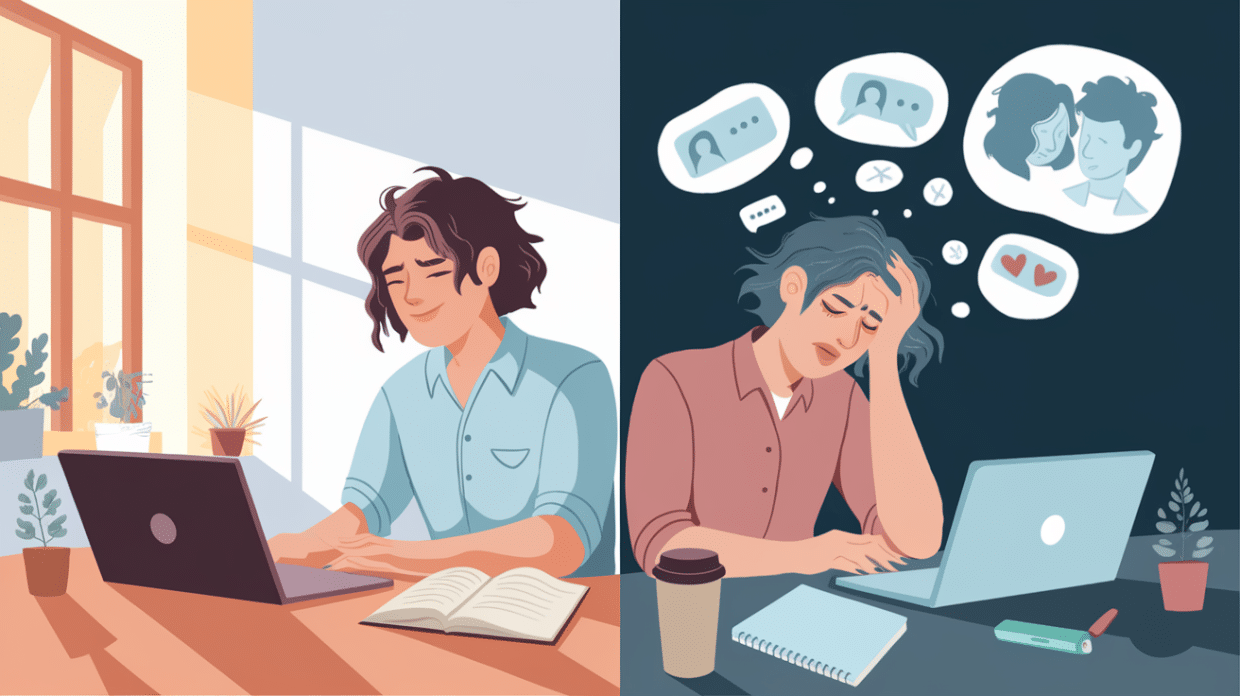Have you ever found a person taking up space in your thoughts, no matter how hard you try to focus on something else?
That nagging feeling when someone’s face, words, or actions keep replaying in your mind can be both confusing and frustrating. You’re not alone—most of us have wondered “why can’t I stop thinking about someone” at some point in our lives.
These persistent thoughts aren’t random. They often signal deeper emotional connections, unmet needs, or psychological patterns worth understanding.
In this guide, we’ll learn the common reasons behind these thoughts, how to tell when they’ve become unhealthy, and practical steps to regain your mental freedom.
By understanding what’s happening in your mind, you’ll be better equipped to take control of your thoughts and emotional well-being.
Reasons Why You Can’t Stop Thinking About Someone
When someone occupies your thoughts constantly, there’s usually more happening than just a passing interest.
Your brain may be trying to process emotions, resolve unfinished emotional issues, or respond to a genuine connection. Understanding these patterns can help you make sense of your persistent thoughts and learn how to manage them better.
1. Attraction and Emotional Connection
Physical and emotional attraction often trigger constant thoughts about someone.
When we feel drawn to another person, our brain releases chemicals such as dopamine and oxytocin, creating a reward system that encourages us to continue thinking about them.
This biological response explains why new attractions can be so consuming. The depth of your emotional connection also matters.
People who make us feel understood, valued, or safe tend to linger in our thoughts longer. These strong emotional bonds create lasting mental imprints that your mind returns to repeatedly.
2. Limerence: The Obsessive Infatuation
Limerence goes beyond normal attraction. It’s an intense state of emotional fixation where someone becomes the center of your attention and thoughts.
People experiencing limerence often feel euphoric when thinking about the person, experience extreme mood swings based on the person’s actions, and create detailed fantasies about future interactions.
Unlike balanced attraction, limerence involves obsessive thinking patterns and an intense need for reciprocation.
Your thoughts feel uncontrollable, and you might experience physical symptoms like loss of appetite or trouble sleeping when thinking about this person.
3. Unresolved Emotions and Past Experiences
Unfinished conversations, unclear endings to relationships, or feelings you never expressed can linger in someone’s thoughts.
Your brain naturally seeks closure, and without it, the person remains in your mental space as your mind attempts to make sense of what happened.
Past emotional wounds related to the person can also trigger recurring thoughts. If you experienced hurt, rejection, or strong emotions with someone, your mind might keep returning to those moments as a way to process and heal from them.
4. Anxious Attachment Styles
People with anxious attachment often worry excessively about relationships and seek constant reassurance.
If you have this attachment style, you may find yourself constantly thinking about someone because your mind is trying to predict potential relationship outcomes or threats.
This pattern often links to childhood experiences where attention from caregivers was inconsistent.
As adults, this can manifest as persistent thoughts about someone, frequent checking of their social media, or scrutinizing every interaction for hidden meanings.
5. Fascination and Curiosity
Sometimes, a person’s unique qualities, talents, or perspective can genuinely capture your interest. This intellectual or personal fascination can cause them to appear in your thoughts regularly as your mind explores what makes them different or special.
Curiosity about someone’s life, decisions, or personality can also lead to persistent thoughts, especially if they seem mysterious or difficult to understand fully.
Your brain naturally craves solving puzzles, and people who intrigue us become puzzles we continually try to solve.
6. Mental Health and Psychological Factors
Existing mental health conditions can intensify persistent thoughts about someone. People with anxiety might worry constantly about social interactions with someone, while those with obsessive-compulsive tendencies might develop intrusive thought patterns focused on a specific person.
Stress and difficult life periods can also increase the likelihood of fixating on someone, especially if thinking about them offers comfort or distraction from other problems.
In these cases, the persistent thoughts might be more about your current mental state than about the person.
Keep seeing someone in your dreams, too? Read here: What Does It Mean to Keep Seeing the Same Person in Your Dreams?
When Does Thinking About Someone Become Problematic?
While it’s normal to think about someone you care about or find interesting, there comes a point where these thoughts can shift from healthy to harmful.
Understanding this transition can help you recognize when you might need to change your thought patterns or seek support.
Healthy Interest vs. Obsessive Thoughts
The line between normal interest and harmful fixation can be thin and easily crossed without notice.
Understanding this boundary helps you monitor your thinking patterns and recognize when you might need to take a step back from intense emotional attachments.
Normal Attraction vs. Obsession
Healthy interest involves thinking about someone in a balanced way that doesn’t control your emotions or actions.
You can go about your day without their presence dominating your thoughts. You maintain perspective about who they really are, rather than creating an idealized version of them.
Obsessive thinking, however, often feels uncontrollable and occupies most of your mental space. You may find yourself unable to focus on anything else, constantly checking your social media, or interpreting unrelated events as somehow connected to you.
The person becomes the center of your thoughts and emotions in a way that feels overwhelming.
Warning Signs of Obsession
Watch for these signals that indicate your thinking has become problematic:
- You can’t go more than a few minutes without thoughts of this person interrupting your focus.
- You create detailed fantasies about future interactions or relationships that have little basis in reality.
- You experience intense emotional highs and lows in response to brief interactions or social media activity.
- You’re neglecting important responsibilities because you’re distracted by thoughts of this person.
- You’re making major life decisions based on how they might affect your connection with this person.
- You feel anxious, distressed, or empty when you try to stop thinking about them.
Impact on Daily Life
Persistent thoughts don’t just stay in your head—they spill over into every aspect of your life.
When someone takes up too much mental space, the effects can reach far beyond your emotional state and begin to disrupt your normal routines, relationships, and responsibilities.
How Persistent Thoughts Affect Mental Health and Focus
When someone dominates your thoughts, your mental health often suffers. You might experience mood swings tied to their actions or perceived feelings toward you.
Sleep patterns can become disrupted as you lie awake thinking about them. Your self-esteem might begin to depend on their attention or approval.
Productivity typically declines as your mind constantly wanders back to thoughts of this person. Work tasks take longer to complete, and the quality of your output might decrease.
Emotional stability weakens when obsessive thoughts take over. Small interactions can trigger intense emotional responses that seem disproportionate.
You might feel euphoric one moment and deeply upset the next, all based on how you perceive this person’s feelings toward you.
Recognizing When Thoughts Disrupt Daily Life
Pay attention to these signs that persistent thoughts are affecting your functioning:
- Friends or family members comment on your changed behavior or mention that you seem distracted.
- You struggle to meet deadlines or complete basic tasks that were once routine.
- You cancel plans with others to either spend time with this person or avoid them.
- Your eating or sleeping habits have changed noticeably.
- You feel mentally exhausted from the constant thought loops.
- You’ve started avoiding certain places or activities because they remind you of this person.
- You may notice physical symptoms, such as headaches, stomach issues, or muscle tension, when thinking about them.
Coping Strategies: How to Stop Thinking About Someone
Breaking free from persistent thoughts about someone requires both patience and practical action.
While these thoughts won’t disappear overnight, there are proven strategies that can help you regain mental clarity and emotional balance.
1. Acknowledge Your Feelings
Face your emotions honestly, rather than avoiding them. Name what you’re feeling specifically—longing, hurt, rejection, guilt—to make these emotions more manageable. This helps identify unmet needs in your life that might be driving your thoughts.
Be kind to yourself; judging your feelings only adds shame to an already difficult situation. Treat yourself with the same understanding you’d offer a good friend.
2. Practice Self-Awareness and Mindfulness
Develop awareness of your thought patterns to catch yourself when obsessive thinking begins. Keep a journal to track when these thoughts occur and what triggers them.
Ask what purpose these thoughts serve—comfort, distraction, hope? Mindfulness meditation helps you observe your thoughts without becoming attached to them. Try visualizing each thought as a leaf on a stream, watching it float away.
3. Focus on Healthy Distractions
Give your mind something else to focus on to break the rumination cycle. Select activities that require your full attention and engagement.
Learning something new is beneficial as it occupies mental space while providing a sense of accomplishment. Exercise, creative outlets, and spending time with supportive people can help shift your mental state and offer a fresh perspective.
4. Set Boundaries and Distance Yourself
Create space between you and the person, both physically and digitally. Reducing contact gives your mind time to reset and recharge. Consider a “digital detox” from their social media.
If some contact is necessary, establish clear boundaries about frequency, channels, and topics. Communicate these boundaries directly but kindly.
5. Seek Therapy or Professional Help
When self-help isn’t enough, professional guidance provides structure and support. Therapists offer an objective perspective and help identify unhealthy thought patterns.
Cognitive Behavioral Therapy teaches you to challenge negative thoughts, while Acceptance and Commitment Therapy helps you commit to value-aligned actions despite difficult feelings.
6. Cultivate Emotional Independence
Build a strong relationship with yourself to reduce others’ power over your thoughts. Reconnect with your values, interests, and goals independent of any relationship.
Make decisions based on your needs rather than others’ reactions. Practice self-care and challenge negative self-talk with evidence of your worth.
Emotional independence isn’t about not needing others—it’s about forming healthier attachments without losing your sense of self.
When Should You Seek Professional Help?
While many people can manage persistent thoughts about someone using self-help strategies, there are situations when professional support becomes necessary.
Knowing when to reach out for help is a crucial part of maintaining your mental health.
Signs You Might Need Therapy
Sometimes the line between normal processing and problematic fixation can be hard to see from within your own experience. Understanding these warning signs can help you make informed decisions about seeking professional support.
Consider therapy if your thoughts about someone:
- Have persisted intensely for months with little improvement.
- Interfere with your ability to work, study, or maintain relationships.
- Causes significant emotional distress, like constant anxiety or depression.
- Lead to unhealthy behaviors, such as spending hours monitoring their social media.
- Result in sleep problems that persist despite good sleep habits.
- Trigger thoughts of self-harm or feeling that life isn’t worth living.
- Include plans to contact them despite restraining orders or clear requests to stay away.
Physical symptoms like chronic headaches, digestive issues, or muscle tension that doctors can’t find a medical cause for might also signal that your mental distress needs professional attention.
The Role of a Therapist in Processing Emotions
A therapist serves as an impartial guide through complex emotions that friends and family might struggle to help with.
They create a safe space where you can express difficult feelings without judgment or concern about burdening others. Professional therapists are trained to recognize patterns in thinking and behavior that keep you stuck.
They can help you connect current fixations to past experiences or unresolved issues that you might not see on your own.
Unlike friends who might tell you to “get over it” or “move on,” therapists understand that persistent thoughts often have deeper psychological roots that need careful attention and processing before true healing can occur.
What Therapy Can Offer
Therapeutic approaches for persistent thoughts about someone are well-established and effective when applied consistently.
Therapy provides tools to explore why specific people trigger intense thought patterns, often connecting to early attachment experiences or unmet emotional needs.
Your therapist might use thought records to document these patterns and help you develop more balanced perspectives.
- Exposure techniques can help you face triggering situations while avoiding unhelpful responses, such as checking social media.
- Acceptance-based approaches teach you to observe unwanted thoughts without fighting them, reducing their emotional power and freeing your attention for more meaningful activities.
You’ll identify unhelpful beliefs, such as “Their rejection means I’m unlovable,” and learn to challenge them. This creates space between you and your thoughts, making them less automatic.
Cognitive Behavioral Therapy (CBT) helps you spot obsessive thoughts early, interrupt them with coping statements, and redirect your attention.
Conclusion
Understanding why you can’t stop thinking about someone is the first step toward regaining your mental freedom.
If your persistent thoughts stem from attraction, limerence, unresolved emotions, or attachment patterns, remember that these feelings are part of being human.
The strategies we’ve discussed—acknowledging feelings, practicing mindfulness, creating healthy distractions, setting boundaries, and building emotional independence—can all help break the cycle of obsessive thinking.
If these thoughts significantly impact your daily life, don’t hesitate to seek professional support. Take one small step today, like a five-minute mindfulness practice or journaling about your feelings.








